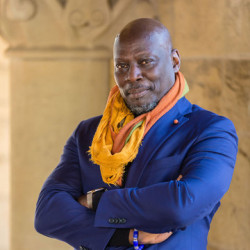
Abstract:
Historians have told us how unevenly infrastructural development was distributed during phase of colonial modernity, with much of it being concentrated in certain urban areas and deliberately biased toward resource extraction. Another aspect of colonial modernity was the ways in which Reason was assumed to be concentrated in the colonial bureaucratic apparatus of courts, administrative procedures, and the legislative councils, among many other features of the colonial system. Contrasting examples of these are to be found in Amadou Hampate Ba’s Fortunes of Wangrin and Chinua Achebe’s Arrow of God, among various others. One aspect of colonial modernity that is not attended to by historians, however, is the degree to which it also generated the ambiguation of the colonized attitudes to their individual selves as well as to that of their communities. It is this ambiguation that we see in African literature. Thus, Okonkwo’s decisive act against the white man’s messenger at the end of Things Fall Apart represents an epistemological impasse for the people of Umoufia (“Why did he do it?” they ask in bewilderment), while Elesin Oba’s failure to successfully complete the ritual suicide is interpreted by him to Iyaloja as the “blasphemy” of relief in seeing for one fleeting moment the hands of his own gods in the intrusion of the white police commissioner. What I propose to do is to explore the terms of this historical ambiguation, and of the related concept of the difficulty of giving an account of oneself (Butler) when the instruments of self-accounting are corrupted by history itself. I shall be making references to Achebe’s rural novels, Soyinka’s plays, Kamel Daoud’s The Meursault Investigation, Tayeb Salih’s Season of Migration to the North, and to Tsitsi Dangarembga’s Nervous Conditions, among various others.
Bio:
Ato Quayson is the Jean G. and Morris M. Doyle Professor in Interdisciplinary Studies and Professor of English at Stanford.
He studied for his undergraduate degree at the University of Ghana and took his Ph.D. from the University of Cambridge after which he held a Junior Research Fellowship at Wolfson College, Oxford before returning to Cambridge to become Reader in Commonwealth and Postcolonial Literature in the Faculty of English from 1995-2005. He was also Director of the Centre for African Studies and a Fellow of Pembroke College while at Cambridge. Prior to Stanford he was Professor of African and Postcolonial Literature at New York University (2017-2019) and Professor of English and inaugural Director of the Centre for Diaspora and Transnational Studies at the University of Toronto (2005-2017). In 2016 he was appointed University Professor at the University of Toronto, the highest distinction that the university can bestow.
Professor Quayson has published 6 monographs and 8 edited volumes. His monographs include Strategic Transformations in Nigerian Writing (1997), Postcolonialism: Theory, Practice, or Process? (2000), Calibrations: Reading for the Social (2003), and Aesthetic Nervousness: Disability and the Crisis of Representation (2007). Oxford Street, Accra: City Life and the Itineraries of Transnationalism (2014) was co-winner of the Urban History Association's 2015 Best Book Prize (non-North America) and was named in The Guardian as one of the 10 Best Books on Cities in 2014. His most recent book is Tragedy and Postcolonial Literature (Cambridge University Press, 2021).
Audience
- Faculty/Staff
- Student
- Public
- Post Docs/Docs
- Graduate Students
Contact
Program of African Studies
(847) 491-7323
Email